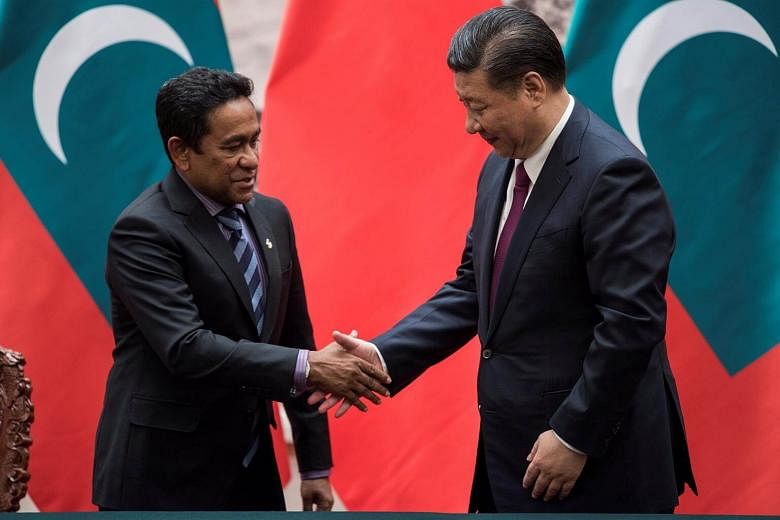China and Maldives signed a free trade agreement this month, and Sri Lanka recently handed over a major port to Beijing.
These moves by China have led New Delhi to remind its neighbours to keep India's security concerns and sensitivities in mind in their bilateral deals.
Analysts said the development signalled China's increasingly assertive push into South Asia, where many countries are within India's traditional sphere of influence.
New Delhi is fearful that economic engagements could pave the way for military and security cooperation.
"The Chinese are entering through economic and also political arrangements with leaders in Bangladesh, Pakistan, Maldives, Sri Lanka and Nepal... They will have long-term implications," said Dr Srikanth Kondapalli, professor in Chinese Studies at Jawaharlal Nehru University.
Speaking about Sri Lanka's handing over the Hambantota port to China on a 99-year lease, India's External Affairs Ministry spokesman Raveesh Kumar said last week: "We continue to take up with Sri Lanka issues related to the security concerns in the region and expect that our Sri Lankan friends will keep in mind our security concerns and sensitivities," he said.
New Delhi has, meanwhile, reminded Maldives of its stated India First Policy in foreign affairs.
China and Maldives early this month signed a free trade agreement. This was one year after Maldives President Abdulla Yameen had said the island-nation would sign its first FTA with India.
The agreement gives Maldives full market access to the Chinese market for fishery and other products, while China will have access to areas like infrastructure, tourism and education.
"China has become more aggressive under Xi Jinping.
"India has to realise that smaller neighbours have options and they can't be under India's protective umbrella forever. They also have aspirations," said Mr Lalit Mansingh, chairman of the Kalinga International Foundation.
He added: "We have to reset ties to treat them as equal sovereign states. We have to increase and also understand their compulsions. China has promised more development assistance than India. That has to change. India must take advantage of its proximity."
China, for some years, has been slowly increasing its presence in India's neighbourhood, from Pakistan and Nepal in the north to Sri Lanka and Maldives in the south, in what Indian strategists have termed a "string of pearls" encirclement by China.
Beijing's major infrastructure projects include the China-Pakistan Economic Corridor, which includes building ports and railway lines and is part of China's One Belt, One Road initiative.
While Prime Minister Narendra Modi has made India's neighbourhood policy a priority and has visited most of the neighbouring countries, analysts say New Delhi has to do much more.
Following the latest developments, editorials in Indian newspapers wondered if India is losing its influence in the neighbourhood.
"Has Maldives slipped out of India's grip? China steals another ally," said an Indiatoday.in headline.
China's influence looks set to grow further.
In Nepal, an alliance of communist parties which includes the Communist Party of Nepal, known to be keen on closer ties with China, have come to power.
India's delay in congratulating the winning parties - the Communist Party of Nepal-Unified Marxist Leninist and the Communist Party of Nepal-Maoist Centre - which won a majority in the federal assembly, had raised questions. But the Kathmandu Post reported that Mr Modi called to congratulate their leaders yesterday.

